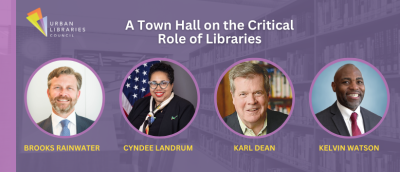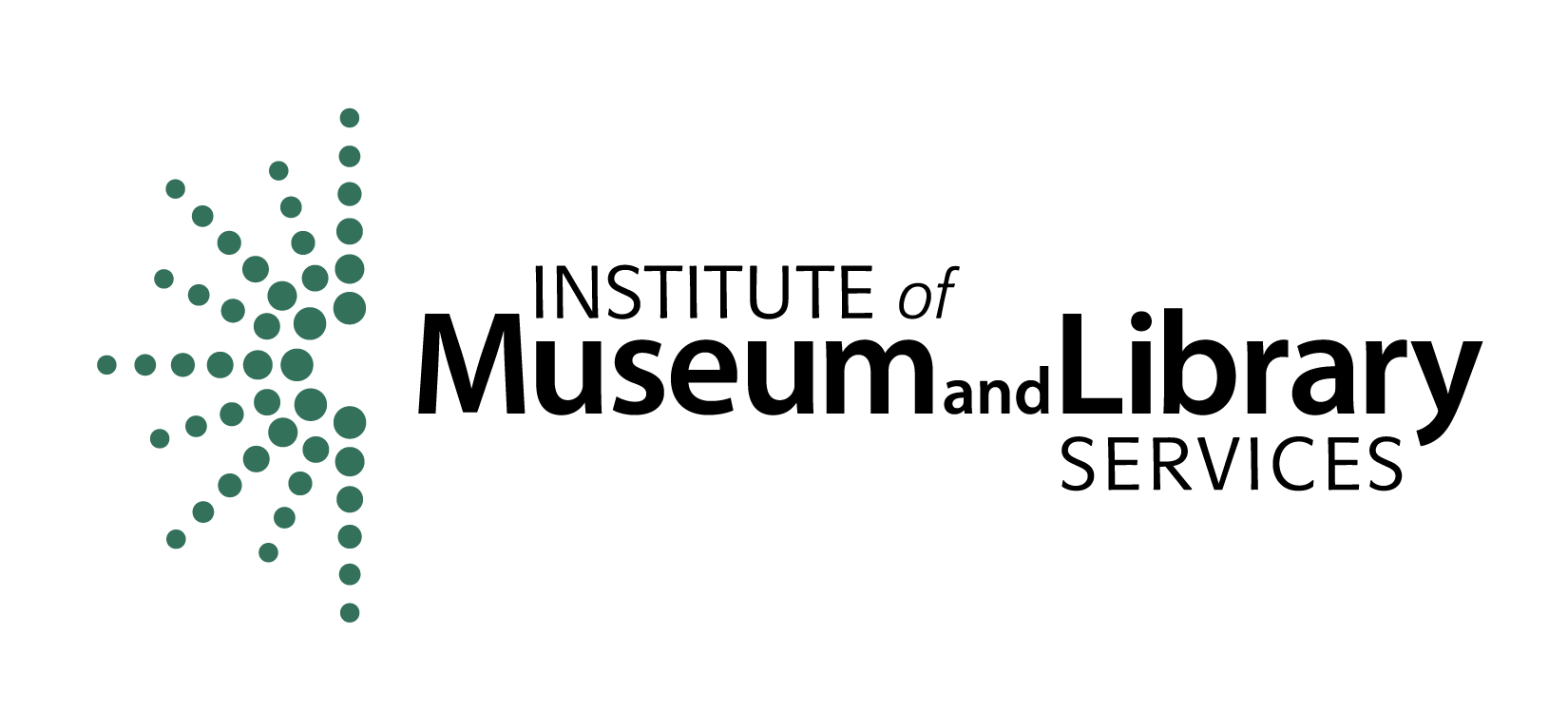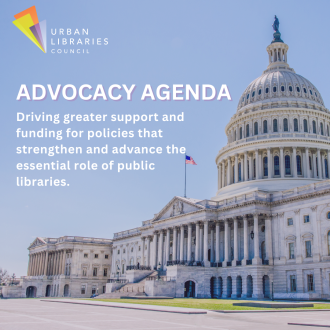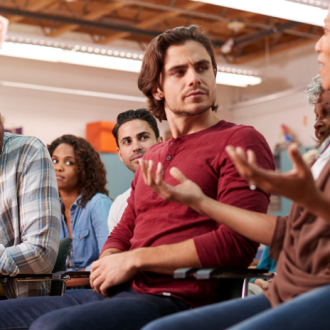Five Ways Public Libraries Go Far Beyond Books

Written by Abby Carlson, Research and Program Consultant, Urban Libraries Council
On March 4, the Urban Libraries Council hosted a virtual town hall on the critical roles public libraries play in our communities. No longer reserved for hushed tones and quiet spaces, libraries have morphed into vibrant and colorful places for gathering, learning and innovation. We welcomed leaders with experience engaging with local, state and federal government policymakers to discuss ways for libraries to stay connected with government officials, best practices for partnering with community organizations and how to tell the library’s impact story.
You can watch the town hall below and keep reading for five takeaways from the event.
Urban Libraries Council | A Town Hall on the Critical Role of Libraries | March 4, 2024
1. The role of the public library spans far beyond books.
Public libraries bring people together and are rewriting common assumptions of what people think a library does. They serve a trusted public common for social innovation and civic engagement. They partner with community organizations to address issues such as food access and job training. Furthermore, they also work with local government to be a reliable resource and space during a crisis, like extreme weather emergencies.
“The community is the library, and the library is the community,” said Kelvin Watson, Executive Director of the Las Vegas-Clark County Library District. “We’re the anchor for many more things than books.” He shared that in his district, 17 libraries have a hydroponic garden program to address the negative impacts of being in a food desert. The program teaches people of all ages how to grow healthy food without the need for soil, whether it is at home or at the library.
Libraries are increasingly important for social well-being, civic engagement and building trust in public institutions. Libraries look different now to serve this purpose, as many buildings are designed to include accessible community rooms to be a public gathering space. This extends to how libraries are staffed, too.
Deputy Director for Library Services at the Institute of Museum and Library Services (IMLS) Cyndee Landrum said this is an opportunity to leverage not just a librarian’s traditional area of training like locating books and referencing information, but also their expertise as facilitators and one-on-one communicators.
2. Libraries should have a seat at the table for community policy- and decision-making.
Library leaders should be proactive in ensuring the library is a part of community conversations and initiatives. As a public institution and critical civic infrastructure, the library’s perspective is instrumental in shaping how community problems are approached and solutions are addressed.
“The library space is very expansive. And where we find ourselves, we need to think about as our space and places.”
Kelvin Watson, Executive Director of the Las Vegas-Clark County Library District
When ULC’s Immediate Past Board Chair Karl Dean was mayor of the Metropolitan Government of Nashville and Davidson County from 2007 to 2015, he applied this thinking to the Limitless Libraries program. This initiative worked to break down the wall between schools and libraries to support literacy goals and instill a love of reading among school-age children and teens. The public libraries in his city found that by working with public school libraries they could ensure students had access to any book in the library system within a couple of days of requesting it. The program was a huge success and implemented widely across libraries in Nashville.
3. Partnerships between public libraries and local government are vital to the health of our communities.
The key to libraries working well with local governments is to recognize that elected officials are helpful partners. An important part of that relationship to for libraries to be intentional about keeping local officials engaged and informed. Library leaders should make it clear to government decision makers that their expertise goes far beyond what may be traditionally considered. The public library’s ability to educate and inform around subjects such as emerging technology, privacy issues or intellectual freedom can be harnessed by local officials to make informed and beneficial decisions for the community.
This relationship can be mutually beneficial. Public libraries offer a safe and accessible space for elected officials to meet with their constituencies, so the community can gather and learn about local government initiatives. Libraries also have direct contact with residents daily, offering a unique insight into the issues the community is facing. This relationship with the public can inform local officials in their decision-making and / or encourage them to be a supportive resource for libraries to address these issues.
During the town hall, Karl Dean recalled the many ways the Nashville Public Library played a role in advancing government services during his tenure as mayor. The library was integral in helping people sign up for the Affordable Care Act; it offered services to help newcomers through the immigration process; and it provided job information and access to computers during the Great Recession.
Fostering this relationship between libraries and elected officials is especially important during an election year. Libraries support civic health, build community trust, allow elected officials to stay informed about their constituencies, and enhance interconnections between citizens and government.
“So much of what we see on the TV screen is just politicians yelling back and forth,” said Brooks Rainwater, president and CEO of ULC. “But libraries play a different role, and it’s to bring people together.”
4. Libraries should tell the story of how they are serving the community beyond books.
As local governments face rising costs and fluctuating tax revenues, securing funding for public libraries may often come down to being a persuasive storyteller. The library story must be told in a way that resonates with decision makers and makes clear how integral it is to the community.
During the town hall, speakers offered some strategies to better tell the story about the library’s impact in the community. One idea was to connect the dots about what the library does to other important social issues impacting the community.
“The work [a city does] with the homeless, with education, with immigration, with preserving intellectual freedom goes on seven days a week and our budgets really cannot be cut. They need to be actually enhanced,” said Karl Dean about the issues influencing local budgets.
In telling this impact story, the library should utilize influential validators like community organization leaders and other library champions in local government to underline just how necessary continued support is.
Sharing a library’s success and impact is not just regulated to budget season. Through continuous communication and collaboration, libraries can make it clear that they are natural allies to government officials and their interests are aligned.
Kelvin Watson shared an instance of utilizing partnerships wisely to benefit the library and the community. Libraries in his district recognized a need from the community to have social workers at locations but knew that hiring social workers directly would impact the library’s budget. Instead, the Las Vegas-Clark County Library District chose partnered with other county agencies to bring in these needed services. This helped the library’s bottom line and demonstrated its ability to partner with local government to help meet a community need.
5. Libraries must reimagine their role in the future and transform themselves internally.
Many recent concerns around the future of libraries focus on the challenges that AI and intellectual freedom pose, but the act of ensuring that libraries continue to thrive often comes down to making people feel welcome and being a trusted space.
To do this, libraries must “reimagine [their] role in the future. Reimagine how [they’re] going to address big challenges out in the world that we’re seeing in our community,” said Cyndee Landrum.
A consistent theme that also arose in addressing this was how libraries can transform from the inside out by rethinking how they function and operate. This includes addressing internal operations, policies, impact on staff and grant-making. “For us to transform our services, we have to transform ourselves internally,” said Kelvin Watson.
Read more about libraries can transform lives and strengthen their communities in this blog post from ULC President and CEO Brooks Rainwater.

This project was made possible in part by the Institute of Museum and Library Services grant LG-251100-OLS-22.
Related Articles

Driving Greater Advocacy for Urban Libraries
How is ULC driving greater advocacy for urban libraries? Check out the latest blog post from ULC President and CEO Brooks Rainwater the federal legislation and funding resources needed to empower public libraries to meet evolving community needs.
Read More

Cornerstones in a Culture War
ULC continues to stand with and for North America's public libraries to fight for free information and access for all through initiatives like our Declaration of Democracy and the Democracy Advocacy Group.
